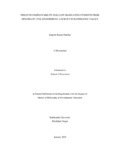
Please use this identifier to cite or link to this item:
https://hdl.handle.net/20.500.14301/468Full metadata record
| DC Field | Value | Language |
|---|---|---|
| dc.contributor.author | Panthee, Sanjeeb Kumar | - |
| dc.date.accessioned | 2025-03-05T08:05:01Z | - |
| dc.date.available | 2025-03-05T08:05:01Z | - |
| dc.date.issued | 2025-01 | - |
| dc.identifier.citation | Panthee, S.K.(2025).Perceived employability skills of graduating students from diploma in civil engineering: A survey in Kathmandu valley. | en_US |
| dc.identifier.uri | https://hdl.handle.net/20.500.14301/468 | - |
| dc.description.abstract | Perceived employability is an individual's perception regarding the possibility of getting and maintaining employment. Employability skills are all about what employers expect from the graduate. The Council for Technical Education and Vocational Training is the apex body in Nepal that conducts technical programs. The civil engineering diploma course started about two decades ago and the course duration is three years . A civil engineering diploma course is conducted through various CTEVT-affiliated institutions. In the last few years, the employment rate of civil engineering graduates has been on a declining trend. Shrinking opportunities for the graduate could be because of not having the appropriate skills demanded by the world of work. There are only a few studies that have focused on the employability skills of diploma-level students. Thus, this study had an objective to find the level of perceived employability skills of diploma- level civil engineering students in the Kathmandu Valley. This study utilized a quantitative research approach with a survey design. Questionnaires from similar studies in Nepal and other countries were contextualized, remaining in the premises of Human Capital Theory. The survey was conducted among 294 diploma-level civil engineering students in the final semester of their studies and were the survey respondents. A t-test, ANOVA, and binary logistic regression were used for data analysis. Reliability, validity, and ethical consideration were ensured. The study revealed that among the three dimensions of employability skill, students had the lowest level of perceived employability skill in core skill followed by generic skill and personal attributes. The overall perceived employability skill of the respondent is at the presence level. A significant difference exists in perceived employability skills across ethnicity, surroundings, and locale. The finding also showed that students who graduated from a community school in the Secondary Education Examination had higher perceived employability skills than institutional schools. Similarly, students pursuing their diploma in a civil engineering course at a private institution had the lowest level of employability skills. The study also revealed a positive relationship between learning achievement and employability skills; however, the strength of the relationship is very weak. Similarly, types of schools (SEE and CTEVT) influenced perceived employability skills. The findings of this study can be useful for all three stakeholders: students, employers, and institutions. Students can now focus on the core skill in which they have performed lowest, and the employer can now work closely with the academic institutions to develop the skills that students lack. Similarly, academic institutions can develop separate modules to train the students on the skills they lack. Furthermore, this study also paves the way for future researchers and policymakers to address employability skills through policy intervention and the appropriate course. | en_US |
| dc.language.iso | en | en_US |
| dc.publisher | Kathmandu University School of Education | en_US |
| dc.title | Perceived Employability Skills of Graduating Students from Diploma in Civil Engineering: A Survey in Kathmandu Valley [Unpublished MPhil Dissertation] | en_US |
| dc.type | Dissertation | en_US |
| local.school.name | SOED | en_US |
| local.school.department | DODE | en_US |
| local.school.program | MPhil in Development Studies | en_US |
| local.school.level | M.Phil. | en_US |
| Appears in Collections: | Dissertation | |
Files in This Item:
| File | Description | Size | Format | |
|---|---|---|---|---|
| 25 05 11 sanjeeb panthee.pdf | 1.53 MB | Adobe PDF |  View/Open |
Items in DSpace are protected by copyright, with all rights reserved, unless otherwise indicated.